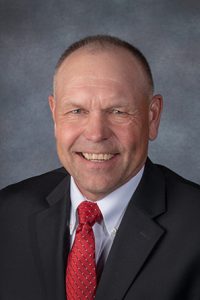Bill would merge natural resources, environmental agencies
The Natural Resources Committee heard testimony Feb. 13 on a bill that would merge two state agencies tasked with safeguarding, regulating and monitoring Nebraska’s water resources.

LB317, introduced by Plymouth Sen. Tom Brandt at the request of Gov. Jim Pillen, would merge the state Department of Natural Resources into the state Department of Environment and Energy, which would be renamed the Department of Water, Energy and Environment.
The director of the Department of Environment and Energy would become director of the new agency. The Department of Natural Resources director would become the Chief Water Officer and retain authority for administration of the former department’s duties.
The Department of Natural Resources regulates the storage and use of Nebraska’s surface water and authorizes groundwater transfers by industrial and municipal users. It also works with the state’s Natural Resources Districts to manage groundwater use in certain river basins.
The Department of Environment and Energy administers the rules, regulations and standards intended to protect and improve the state’s water, air and land quality. Among the many programs it oversees are two delegated by the federal EPA that ensure safe drinking water and protect Nebraska’s surface water and groundwater resources.
Brandt said the merger, which would take effect July 1, would integrate the regulatory work of the Department of Environment and Energy with the planning expertise of the Department of Natural Resources. Although the proposal would incur approximately $100,000 in rebranding costs, he said, the expense would be offset by eliminating redundant administrative functions.
“By consolidating resources, we can address long-term challenges such as nitrogen management and soil health more effectively, benefiting both our ag producers and the sustainability of our natural ecosystems,” Brandt said.
Pillen testified in support of the measure. He said managing the quality and quantity of Nebraska’s water is critical not only for the agriculture industry but for a coming “extraordinary boom” in new industries, including hydrogen and biofuel production, that require large amounts of water.
In addition to the proposed merger, Pillen said, he also will create a task force to examine potential changes to the state’s water policies.
“To move forward, we need to double down on our efforts to protect and enhance this valuable resource,” he said.
Jesse Bradley, interim director of both agencies, also testified in support. He said the merger would improve coordination among state and local water managers and speed planning and permitting.
Testifying in opposition to LB317 was Jasper Fanning on behalf of the Nebraska Association of Resources Districts. Although the merger would not eliminate Department of Natural Resources personnel, he said, it could distract them from NRD and state priorities, particularly the Perkins County Canal Project and the South Platte River Compact.
“We have a very collaborative, problem solving agency at DNR that works … to benefit the people of Nebraska,” Fanning said. “I would argue that [NDEE] … focuses more on federal mandates.”
He said NRDs and other stakeholders would like to have further discussions with the governor about a merger’s details and objectives before moving forward.
LeRoy Sievers of the Nebraska State Irrigation Association also testified in opposition, saying the merger would not result in the expected savings because both agencies’ personnel are “fully engaged.”
Additionally, Sievers said, the new Chief Water Officer would not carry as much weight as the current DNR director in any future negotiations or litigation over the state’s water rights.
“Having an agency devoted to water truly makes a difference,” he said.
Also in opposition was Bruce Rieker of the Nebraska Farm Bureau. He said the organization wants to help advance the governor’s goal of modernizing Nebraska’s water management practices, but it decided to oppose the merger “until we have enough information to make an informed decision.”
“One of our board members just flat out asked me ‘why,’ and I didn’t have the answer,” Rieker said.
The committee took no immediate action on the bill.


